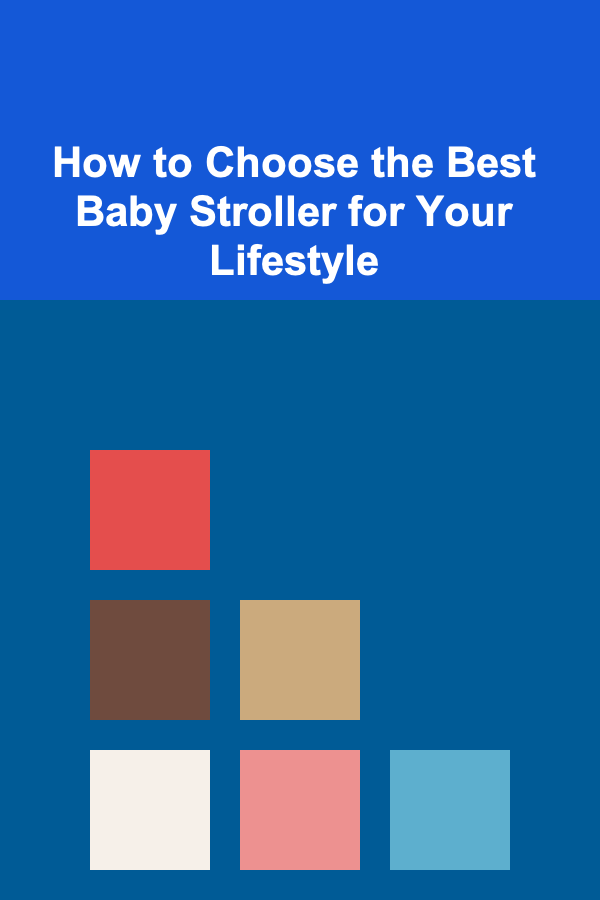
How to Choose the Best Baby Stroller for Your Lifestyle
ebook include PDF & Audio bundle (Micro Guide)
$12.99$5.99
Limited Time Offer! Order within the next:

Choosing the right baby stroller is one of the most important decisions you'll make as a parent. A stroller isn't just a transportation tool; it's an investment in your baby's comfort, your convenience, and your lifestyle. Whether you're a city dweller with busy streets and crowded sidewalks or a nature lover who enjoys off-road walks, the stroller you choose will have a big impact on your daily routine.
With so many options available---each offering different features, benefits, and styles---how do you pick the best stroller for your family? This guide will help you navigate the complexities of stroller shopping and find the right one that fits both your needs and lifestyle.
Step 1: Understand Your Primary Needs
Before you start looking at stroller features, it's crucial to first identify your primary needs. This will help you narrow down your options based on your daily routine, environment, and long-term goals.
Consider the Following Factors:
- Lifestyle: Are you an urban parent who walks to work or a suburban mom who drives everywhere? The terrain you navigate regularly will influence your choice.
- Storage Space: Do you have a small car with limited trunk space, or do you have a larger vehicle that can accommodate a bulkier stroller?
- Travel Frequency: Are you planning to travel a lot by plane, train, or car? If so, you might want a stroller that folds easily and meets airline regulations.
- Future Plans: Will you be having more children soon? Consider strollers that can accommodate siblings in the future.
Taking time to understand your lifestyle and expectations will help you choose the most appropriate stroller for your family.
Step 2: Consider the Different Types of Strollers
Once you've assessed your needs, it's time to explore the different types of strollers available. Each type has its pros and cons, and understanding them will help you decide which is best for you.
1. Standard Strollers
These are the most common type of stroller, providing a balanced combination of comfort, storage, and maneuverability. They're great for daily walks, errands, and outings.
- Pros: Comfortable for your baby, spacious, with decent storage options.
- Cons: May be too bulky for small cars or for parents who need to navigate narrow spaces.
2. Lightweight Strollers (Umbrella Strollers)
As the name suggests, these strollers are lightweight, foldable, and compact, making them perfect for parents on the go.
- Pros: Extremely portable, easy to fold and store, ideal for travel.
- Cons: Less storage space, usually fewer features, less comfortable for long rides.
3. Jogging Strollers
If you're an active parent who enjoys running or jogging, a jogging stroller is designed to handle higher speeds and uneven terrains, such as parks and trails.
- Pros: Good for active parents, large wheels, shock absorption, durable.
- Cons: Bulky, not ideal for tight spaces or urban environments.
4. Travel System Strollers
These strollers come with an infant car seat and a stroller base, making it easy to move your baby from the car to the stroller without disturbing them.
- Pros: Convenience for parents with newborns, all-in-one solutions.
- Cons: Bulkier than other types, can be heavy for some parents.
5. Double and Triple Strollers
If you have twins or multiple young children, a double or triple stroller allows you to transport more than one child at once.
- Pros: Accommodates two or more children, saves space by combining seats into one stroller.
- Cons: Larger size, more difficult to maneuver in tight spaces, heavier to lift.
6. All-Terrain Strollers
Designed for parents who love outdoor adventures, all-terrain strollers are equipped with larger wheels that can handle rough paths, dirt, and gravel.
- Pros: Perfect for hiking, running, and off-road walks.
- Cons: Heavy, difficult to maneuver in urban environments, and can take up significant space in your car.
Step 3: Key Features to Look For
Now that you know the different stroller types, let's dive into the essential features you should consider when choosing the best one for your lifestyle.
1. Safety Features
Your baby's safety is the top priority. Look for strollers that offer:
- Five-point harness: This keeps your baby secure in their seat, preventing them from slipping out.
- Brakes: Choose strollers with reliable brakes to ensure the stroller doesn't roll away when parked.
- Reclining seats: A reclining seat can be crucial for a newborn or sleeping baby, ensuring they remain in a comfortable, safe position.
2. Maneuverability and Wheels
Consider how easy it will be to push the stroller, especially in crowded spaces, on different terrains, or through narrow aisles.
- Swiveling front wheels: These make maneuvering easier, especially when navigating tight corners or crowded places.
- Locking front wheels: Some strollers allow you to lock the front wheels in place for more stability when walking or jogging.
- Larger wheels: Strollers with larger wheels (especially air-filled tires) are better suited for rough or uneven surfaces.
3. Weight and Foldability
Consider how often you'll need to fold and transport the stroller, and how heavy it will be to carry when folded.
- Lightweight models: These are perfect for parents who need to carry the stroller often, such as on public transport or when traveling.
- Compact fold: A stroller that folds easily and compactly will be easier to store in your car or at home.
4. Storage Space
You'll need a place to store your diaper bag, snacks, shopping, and other necessities while out with your baby. Many strollers have under-seat baskets, but make sure there's enough storage for your needs.
- Deep, easy-access baskets: Choose a stroller with a spacious, easily accessible basket for added convenience.
- Additional pockets or cup holders: Some strollers offer added storage features such as cup holders, phone pockets, or trays for extra convenience.
5. Seat Comfort and Adjustability
Your baby will spend a lot of time in the stroller, so comfort is essential.
- Padded seats: Look for strollers with well-padded seats that will provide support and comfort for your baby, especially for longer rides.
- Adjustable reclining seat: This allows your baby to lie down for naps or sit upright as they grow.
- Ventilation: Strollers with breathable fabrics or mesh panels will help keep your baby comfortable on hot days.
6. Durability and Build Quality
Since you'll be using your stroller regularly, look for one made of high-quality materials that can withstand wear and tear.
- Frame materials: Look for strollers made with sturdy, lightweight materials like aluminum or high-grade plastic for long-lasting durability.
- Weather-resistant fabrics: Fabrics that are water-resistant or machine washable will help your stroller last longer and stay clean.
7. Cost vs. Features
Finally, balance your budget with the features you want. While a high-end stroller may offer more features, a more affordable model could be just as effective for your needs. Don't get swayed by flashy features unless they truly serve your lifestyle.
- Budget-friendly options: Often, you can find reliable strollers at mid-range prices that have all the essentials.
- Premium models: High-end strollers often include advanced features like better suspension, extra-large baskets, or compatibility with luxury car seats.
Step 4: Test the Stroller in Person
After narrowing down your options based on your needs and preferences, it's important to test the stroller in person. Head to a store that has a variety of strollers on display and try them out.
- Push the stroller: Test how easy it is to maneuver, especially in tight spaces or on different surfaces.
- Fold and unfold it: Check how easy it is to fold and store the stroller.
- Comfort: Sit in the stroller yourself (if possible) to see if the handle height and seat position are comfortable.
Conclusion
Choosing the best baby stroller for your lifestyle involves considering several key factors, such as your daily routine, terrain, and storage needs. By evaluating different stroller types, prioritizing essential features, and testing out options in person, you can make an informed decision that will support both your baby's comfort and your family's needs.
Remember, there is no one-size-fits-all answer. The best stroller for you is the one that fits seamlessly into your life and makes parenting on-the-go easier. Take your time, assess your lifestyle, and choose the stroller that will grow with you and your baby.

How to Choose the Best Holiday Decor for Small Apartments
Read More
How to Establish a Routine for Regular Decluttering
Read More
How to Set Up a Family Picnic Indoors When the Weather Isn't Ideal
Read More
How to Master Coffee Education and Training
Read More
How To Build a Community Bird Garden
Read More
Understanding the Ocean's Carbon Cycle: A Deep Dive
Read MoreOther Products

How to Choose the Best Holiday Decor for Small Apartments
Read More
How to Establish a Routine for Regular Decluttering
Read More
How to Set Up a Family Picnic Indoors When the Weather Isn't Ideal
Read More
How to Master Coffee Education and Training
Read More
How To Build a Community Bird Garden
Read More